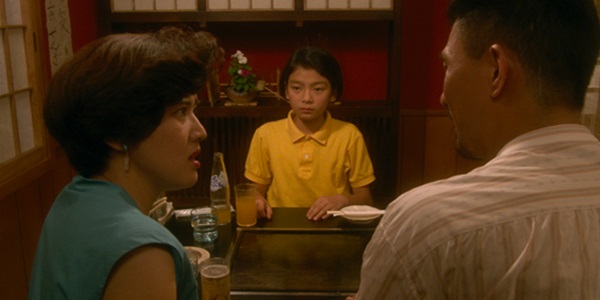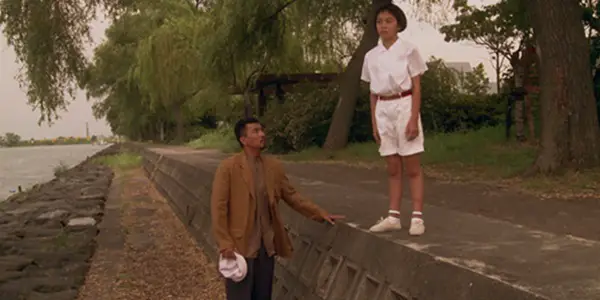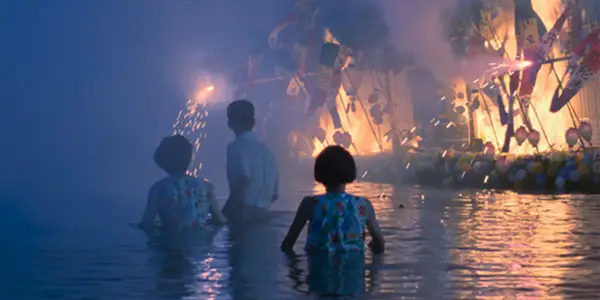MOVING: Divorce Separation Blues

Lee Jutton has directed short films starring a killer toaster,…
The title of Shinji Somai’s magnificent 1993 coming-of-age film, Moving—now available in a new 4K restoration from Cinema Guild—can be interpreted in several ways. There is moving in the form of changing one’s residence, as the father of sixth-grader Renko does when he and her mother decide it’s time to get a divorce. There is moving in the form of physical motion, which Renko spends a large portion of the film doing as she tries to literally outrun the changes put in motion by her parents—changes she refuses to accept, yet are nonetheless guaranteed to alter the course of her future. And, of course, there is moving in the emotional sense, as Somai paints a poignant portrait of one spirited girl’s struggle to survive and thrive during one of the most difficult times of her young life.
Stay Together for the Kids
The life of Renko (Tomoko Tabata, in one of cinema’s most indelible child performances) is thrown into upheaval when her father, Kenichi (Kiichi Nakai) moves out, leaving Renko alone in their apartment with her mother, Nazuna (Junko Sakurada). Divorce is on the horizon but Renko refuses to believe it, just as she refuses to abide by the household contract Nazuna draws up to govern their new life together. When the two of them go out to dinner to “celebrate” their new start, the evening ends with a drunken Nazuna staggering into the house and falling to the ground in front of her deceased mother-in-law’s portrait, berating her for dying and leaving them alone for their marriage to fail. It’s a moment that gives you intense second-hand embarrassment, both for Nazuna in this moment of raw emotional vulnerability and for Renko as she watches her mother go through it without fully understanding the reasons why.

Because Renko gets along better with her easygoing, immature father than her driven, no-nonsense mother (who treats Renko more like a roommate than a daughter), she sees the latter as the primary villain in the separation and punishes her for it, ripping up the household contract and rebelling against Nazuna’s insistence that she not visit Kenichi without permission. Soon she becomes friends with a new girl at school who is bullied over having divorced parents; her newfound companion can immediately tell that Renko’s parents are also separated and offers her advice on how to move forward, advice that Renko hesitates to take as it means she must accept this as her new normal.
Somai’s work in the seishun eiga (youth film) genre shows an empathetic interest in what makes young people push back against the powers that be as they approach the cusp of adulthood. Often, this rebellion is instigated by the inevitable realization that adults are not faultless figures of adulation but just as flawed and confused as the children who look up to them. The reluctance to accept this—not to mention that you will not be able to escape a similar fate when you grow up—motivates the young protagonists of Somai films like the chaotic kidnapping farce P.P. Rider and the melancholic drama Typhoon Club. Moving follows in the tradition of those earlier films of Somai’s, portraying the tragedy of realizing that your parents—the people you rely on the most to set an example for you—are unhappy and in need of a new start. It’s this tragedy that leads Renko to question whether she should have even been born—whether her existence, in tying her parents together, is the reason for their unhappiness. Of course, the truth is more complicated than that, but it takes Renko a long time to realize that she is not the source of her parents’ problems, nor is she responsible (or capable) of fixing them.
Family Portrait
Somai’s films often rely on a loose, lifelike moving camera that follows the actors through their environment and allows for sometimes uncomfortably long takes. In Moving, this camera—shepherded by cinematographer Toyomichi Kurita—adds to the painful reality of Renko’s situation, never more so than in a lengthy, claustrophobic sequence in a narrow hallway outside a room where Renko has locked herself in out of anger at her parents. Outside the door, Kenichi and Nazuna rage at each other, years of barely submerged discontent bubbling over until they come to blows; the emotional and physical violence of the situation is emphasized by the small space in which it occurs and Somai’s refusal to let us look away.

Throughout his career, Somai exhibited a mastery at blocking actors to emphasize the emotional conflict of a situation. In Moving, the main trio of characters are often separated from each other within the frame, signifying their inability to come together and understand one another: whether it be the tall curb that keeps Renko from seeing things on the same level as Kenichi or the walls that physically divide the members of the family within their home. In one particularly poignant scene, Renko passes an old stuffed animal Kenichi had asked for down to him through the bars of a staircase, incapable of coming down to his level to see him eye to eye.
Nakai and Sakurada are excellent in the difficult roles assigned to them, but Moving is Tabata’s movie. Everything about her portrayal of Renko—her facial expressions, her voice, the way she moves through the world—feels utterly authentic and confident. It’s hard to think of a young protagonist in recent memory who better embodies the naivety of youth and the various bratty ways that manifests; you’d have to go back to Yasujiro Ozu’s Good Morning to find another film that so perfectly illustrates the universal feeling of viewing the adult world through a child’s eyes. Watching Moving, and Tabata in it, I was also reminded of a much more recent movie: Charlotte Wells’ Aftersun, which also manages to capture that specific period of adolescent observation where you’re seeing so much more than the adults in your life think you are and yet so much less than you think you are at that time. It’s only when you look back as an adult that you realize how much you missed and misunderstood, something that you cannot help but be reminded of as you watch Moving.

Because Renko cannot bring herself to accept that things can’t go back to the way they were before, when she believes they were all blissfully happy, she tries to recreate happy memories from the past in the present by tricking her parents into joining her on a trip to Lake Biwa like one they took many years before. In the film’s most visually stunning sequence, Renko watches a fiery dragon boat being pulled across the water as part of the famous Lake Biwa Fireworks Festival and she sees herself and her parents in the past, laughing and playing and splashing each other in the water, their giddy faces beautifully lit by the flickering flames. Suddenly, the figures of her parents disappear, leaving the Renko of the past crying out for them desperately as the Renko of the present watches. Even the most seemingly perfect moments of the past—the ones we return to again and again to provide us with comfort and nostalgia—can also contain unbearable pain, especially when viewed through the lens of the experiences that have altered us since then. In this heartrending moment, Renko finally realizes there is no point in dwelling on the past or resurrecting it in the present; all she can do is move forward and make the best of the future.
Conclusion
The culmination of a singular career, Moving is an epitaph not just for a broken family but also for Somai, who passed away in 2001 at the age of only 53. Fortunately, he lives on through his work and the vibrant way in which it portrays all of the ups and downs of life.
The 4K restoration of Moving opens at Metrograph in New York on August 9, 2024. You can find additional release dates here.
Does content like this matter to you?
Become a Member and support film journalism. Unlock access to all of Film Inquiry`s great articles. Join a community of like-minded readers who are passionate about cinema - get access to our private members Network, give back to independent filmmakers, and more.
Lee Jutton has directed short films starring a killer toaster, a killer Christmas tree, and a not-killer leopard. Her writing has appeared in publications such as Film School Rejects, Bitch: A Feminist Response to Pop Culture, Bitch Flicks, TV Fanatic, and Just Press Play. When not watching, making, or writing about films, she can usually be found on Twitter obsessing over soccer, BTS, and her cat.













